THIS WEEKEND, WEST LOOP SALUMI WILL DEBUT patio service at the Taste of Randolph street fest, inaugurating weekend hours of 11 am to 7 pm Friday through Sunday. The idea that you’ll be able to get West Loop Salumi’s superior cured meats as well as cheeses and other tastes to nosh on with a glass (it’ll be BYO) is pretty exciting. “I’ll make you a salami sandwich, you can have a cheese board, a charcuterie board. Just keep it simple—meat, cheese, great crusty bread,” says owner Gregory Laketek.
But for Laketek, the boyish founder and face of West Loop, just the fact that they’re still here at all is pretty amazing. Since it started in 2013, West Loop Salumi has twice been shut down by broken water pipes around their Randolph street space, losing everything they had made and were aging at that point. Besides an apparently wrathful Deity unleashing floods on them, they’ve also faced the more earthbound troubles of being located in a rising hot real estate market and seeing their costs to stay there or expand go up.
West Loop Salumi is in better shape than ever, building a nationwide base for its products through distribution by the high end New York cheese store Murray’s. (It also gives them access to rare cheeses for their cafe, so expect to see things you haven’t seen before.) But the story of how they survived to that point is at least as dramatic as the story of how they got started in the first place. When you enjoy their cured meats this weekend, here’s what you’re tasting—and why you’re still able to taste it at all.
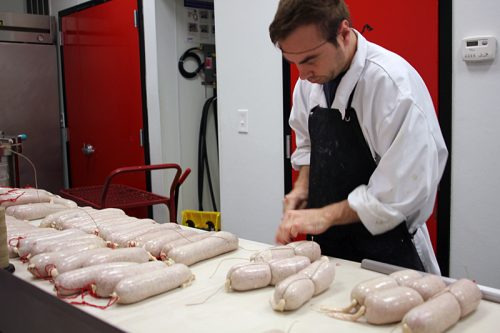
Curtis Laketek making finocchiona
“WHAT WOULD YOU DO WITH A MILLION DOLLARS? Everyone gives you that question in school,” Gregory Laketek says. “So I said, let me just ask myself that question, and I thought… salumi.”
Salumi was not, however, the first answer that he pursued out of school—far from it. “I owned a consulting company for blast mitigation—bomb-resistant windows and doors for military bases. I would consult for general contractors and architects, and manage jobs run on different forts and bases, governmental buildings,” he explains, as I marvel at pretty much the last answer I expected to hear. He did that for a few years, but he admits, “It’s not any kid’s fantasy to come right out of college and start doing that. But owning my own company opened doors for possibilities for the rest of my life. It gave me the opportunity to actually live the future that I would want for myself.”
For a future, he looked back to his past. In the summers, growing up in the northwest suburbs, his parents had sent him and his brother and sister to San Benedetto, in the Marche in Italy, to live with his grandparents. And one of his most vivid memories was of local cured meats and sausages—salumi.
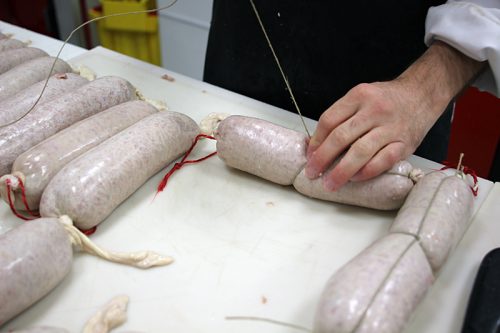
“Not only would I love to do it, but I saw a need for it,” he says. “You couldn’t really get good cured meats in the states—maybe you could get good cured meats, but not the kind that I had in Italy, or that I would want to recreate and be a part of.”
That may seem harsh at first, but there really is a significant difference between American cured meats and what you have in Italy. American cured meats often use curing chemicals, nitrate or “pink salt,” as well as dextrose (corn sugar) to produce quick growth of the healthy bacteria that cure the meat; many commercial examples are cooked as well. The result is a familiar sharp, salty tang to most cured meats.
“I just woke up one day and said, if I want to do something I want to do it to the best, I want to learn from the best.” So he booked a ticket to Italy.
But Laketek had an entirely different experience of cured meats during those summers in Italy. His grandparents “had friends who had farms, and we would make wine, cheese, salumi. And we would get to help out and hang out there, and really experience the culture.”
After selling his business, Laketek went to Kendall for culinary school, and he and a chef friend from culinary school—Blake Royer, who would later write for Serious Eats Chicago—started playing around with salumi, learning from books. West Loop Salumi actually got its commercial start then, cranking out bacon and sausages for The Fifty/50 Group for what was then Bleeding Heart Bakery in West Town. But the salumi they were playing around with according to available books seemed “generic” to him, not like the ideal in his head from those summers in Italy.
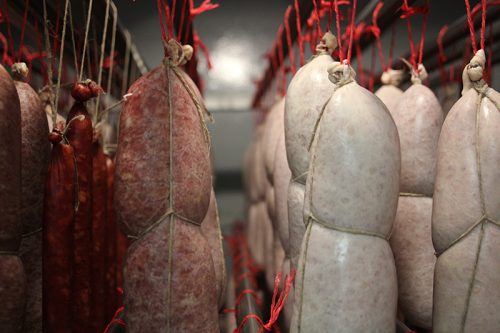
The first chamber manages the water loss of freshly made salumi
“I just woke up one day and said, if I want to do something I want to do it to the best, I want to learn from the best,” he tells me. So he booked a one-way ticket to Italy and a hotel in Parma, home of prosciutto. Once he got there, “I was walking around the streets, didn’t speak any Italian, trying to get a translator, and I saw this poster, all over the city, of this guy holding culatello,” another ham like prosciutto.
He made a reservation for the restaurant on the poster, and asked if he could have a tour beforehand. Once inside, he approached Massimo Spigaroli, the salumiere on the poster. “I told him my whole story, I sold my company and I’m throwing everything I have into the only salumeria in Illinois, which every town in Italy has hundreds of them,” he says. Massimo, apparently impressed by Laketek’s determination, said he’d let him know Monday about a stage. That weekend, he sent Laketek a message: start Monday.
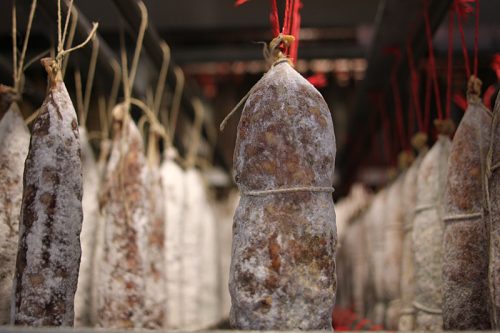
In the second chamber, dry sausages continue to age and develop flavor
He worked there for several months, “twelve, thirteen hours a day,” and learned the secret of Italian salumi: no dextrose, no nitrates or nitrites, just salt and, for the sugars, the local wine. “It takes a lot longer to ferment, about three or four days,” versus a dextrose cure which is fully fermenting within about 14 hours. “When you start to ferment something over three or four days, you’re developing other bacteria which are flavor-enhancing.”
The result, in his product, is cured meat that still tastes like the meat it came from, more than it tastes like salt or a lactic acid tang. It’s often softer than you expect from cured meat—maybe disconcertingly so, like meat that’s been left out, since you don’t have the obvious it’s-been-cured cue of saltiness. But taste it and the doubts disappear—it’s beautiful meat (he buys from midwestern farms, these days mostly Slagel), and it’s been treated with obvious respect… and love.
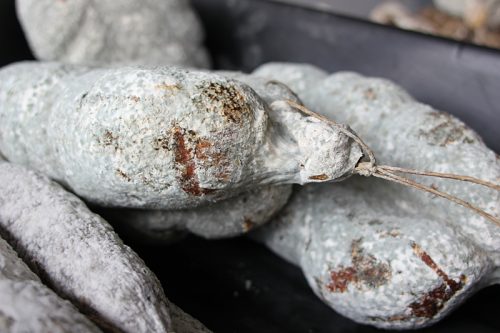
Finocchiona, fully aged and covered with beneficial white mold
Or as Laketek sums up his experience: in Italy, “I learned how to do it right without learning how to do it wrong to begin with.” This is in contrast, he’s found, to many of the people who have approached him about working at West Loop Salumi, but have experience with American methods which he would have to “detrain” them out of. He cites the example of American cured meats sometimes being started in a brine, which to Laketek, “burns” the meat with salt. He let an employee do a $14,000 batch of bresaola that way, and when he tasted it, he found it inedibly salty. But the bresaola was put to good use anyway—if you want to hang some of West Loop’s wares over your meat counter, he’ll send you one of those bresaola logs to hang—for display purposes only.
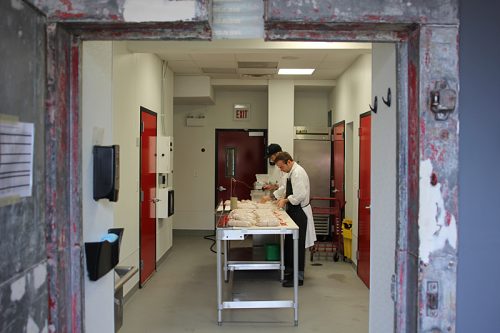
LAKETEK BUILT OUT A FACILITY ON RANDOLPH that almost has the compactness of a train compartment—just two walk-ins for different stages of aging, sausages hung one after another on racks that fit snugly inside. “It’s not really refrigeration—it’s controlling the climate,” he says of the computer-controlled systems that manage each room so that the meats lose moisture at a precise rate as they cure. In the center of the room is a production table; today Gregory’s brother Curtis is trussing up a small herd of finocchiona, a fennel-flavored sausage. Given the amount of time certain things have to age, space is a constant problem… well, at least it is if you have Laketek’s standards. “Sure, culatello, we could release that at 14 months, but if you’re ever had three to five year culatello, it’s life-changing,” he says. I can only imagine.
He started offering finished product in mid-2013, with Jesse Katzman (formerly of Avec) as his sole employee, and was soon off to a good start. Shops like Provenance carried his products almost immediately, Eataly carried them when it opened later that year, and they were featured on various menus around town. “Chefs, they move around countrywide,” he says, and because he was USDA, not just Illinois, inspected, he could sell anywhere in the U.S. as word spread from Chicago to other parts of the country.
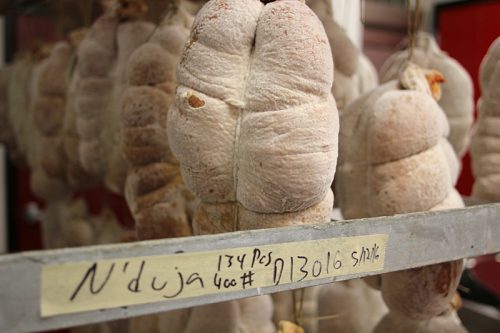
But 2013-4 was the winter of the polar vortex. Laketek was bringing in $18,000 of meat a week to meet the sales he already had—and then a pipe above the walk-ins burst, flooding the entire facility. He lost $140,000 in inventory and, more importantly, all of his clients, at least until production could ramp up again.
“We started up again, we were rocking really hard,” he says, and then in January 2015 the cold hit again—this time a pipe in the middle of Randolph Street broke. Not only were they unable to have running water, shutting them down again for months, but Laketek had to pay to dig 14 feet down to repair the pipe. This time he was at the end of his personal resources; in December he got a capital infusion from new partners for the first time.
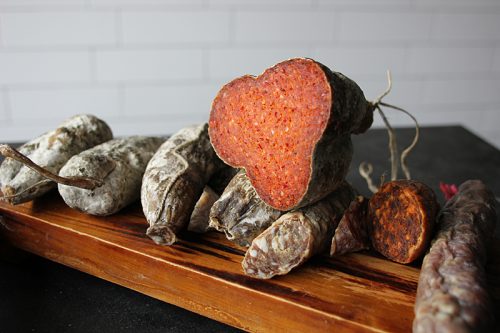
A large piece of spicy nduja (spreadable Sicilian sausage) and a similarly colorful end of Spanish chorizo, among other meats
IF HIS DREAM OF PERSONAL INDEPENDENCE in the business is over, he’s excited by the new opportunities that capital and connections offer. For the Chicago market, he’s being distributed by Local Foods, which allows him to move product out and let it spend most of its aging time in their much more spacious facilities; making a cafe out of his present storefront is part of making better use of his expensive Randolph address, while he’s working on developing a bigger production facility in a cheaper part of town. (The upstairs already has another use—Laketek lives there.)
But increasingly West Loop Salumi is focused on becoming a national artisanal brand, not just a Chicago one. These days he often has the highest of high end collaborators—we taste a sausage he made specially for one company using their product for the wine in the sausage… Veuve Cliquot champagne. “I love wine, so what better way than to be drinking Dom while you’re making salami,” he laughs.
And signing with Murray’s Cheese Shop for national distribution is a big opportunity—”They work with larger clients that we could never get in front of. So we’re talking to Jet Blue airlines, we’re talking to Delta airlines to be on their coach food menus. We’re also working with Nomad Hotel in New York, Kona Hawaii Four Seasons…” he trails off a long list of places that sounds like many of the ritziest vacation spots in America. Just where you’d want a really nice stick of salumi, or a three year culatello.
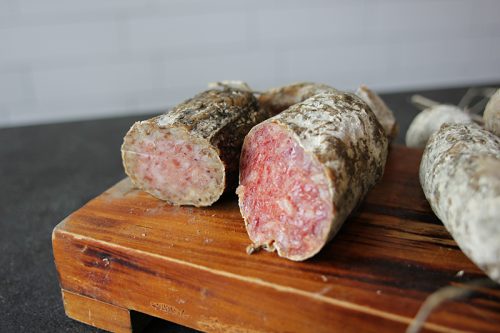
A couple of other salamis, one made with Veuve Cliquot
There’s a story he tells me that seems to sum up the role he’s played, as one businessman among many, in making the West Loop one of America’s hot, talked-about restaurant districts. “I was at this Jean Banchet Awards dinner, and one of the women said, ‘Oh, I brought this chef in from California, and I said we’re going to eat in the West Loop, and he goes, Oh, West Loop Salumi? And I said no, the West Loop is an area.'”
Even younger-looking than his 31 years, Laketek tells a story like that and it’s like he’s standing on the prow of the West Loop restaurant scene, shouting “I’m king of the world!” But then he looks back on the history that got him to this point, and his inner grizzled veteran, survivor of two winters that tried to kill him and his business, comes out.
“Every year, we hit some kind of struggle, but we keep going. But we haven’t had a full year of West Loop Salumi,” he says. “I started at a young age, so it’s been a long learning curve. Usually, when you start your own company, you have other positions that you’ve held prior to that, to be able to apply to it. Mine is just learning as I go.”
Michael Gebert is aging nicely as editor of Fooditor.
Latest
Join the Discussion
After you comment, click Post. If you're not already logged in you will be asked to log in or register with Disqus.



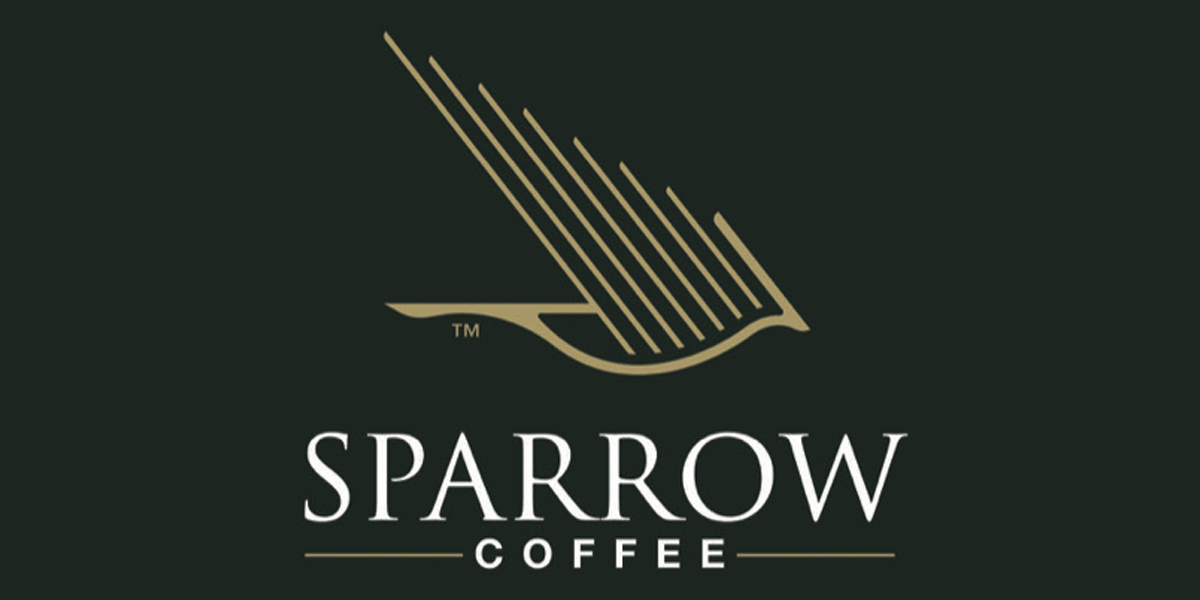
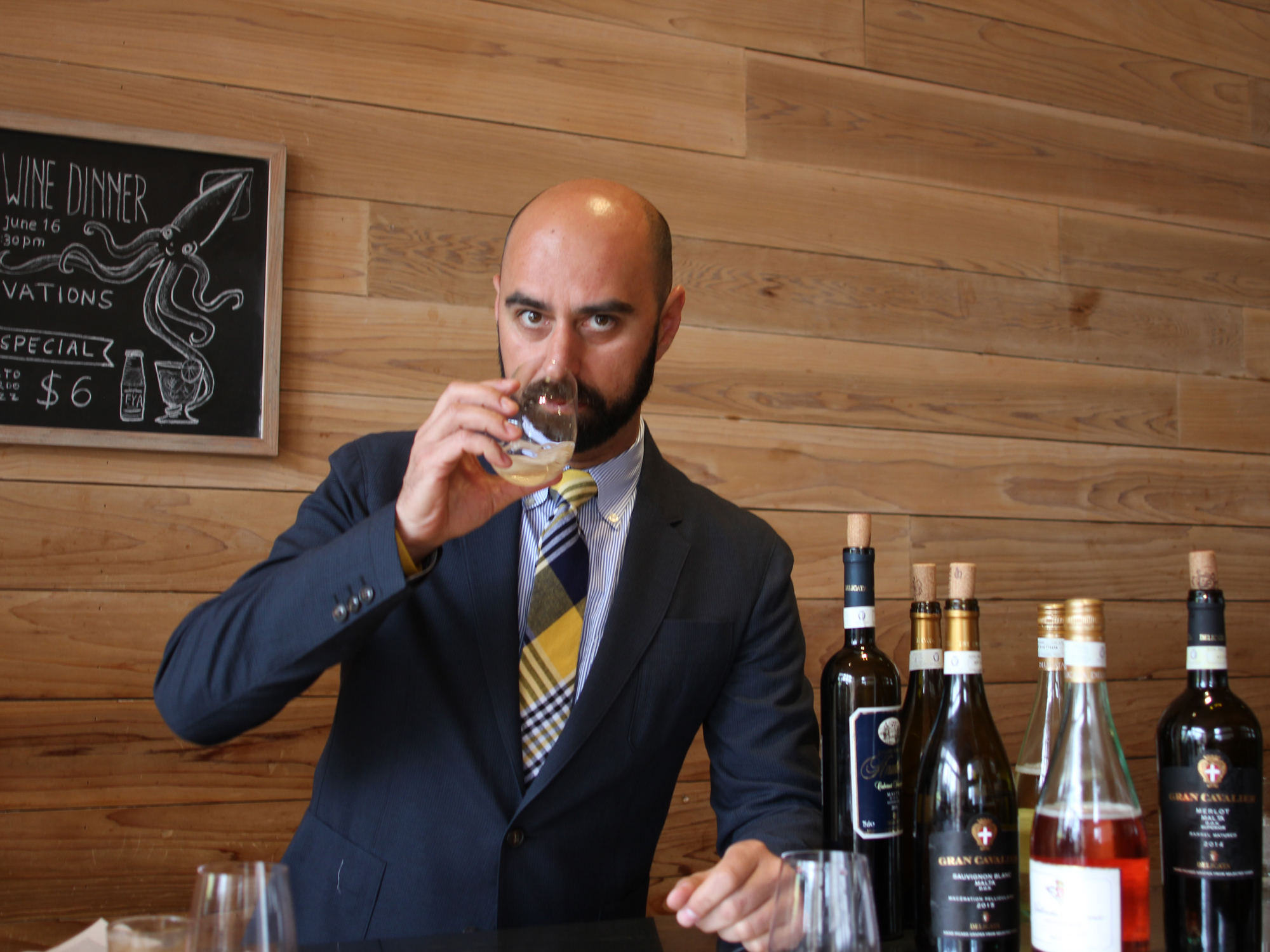
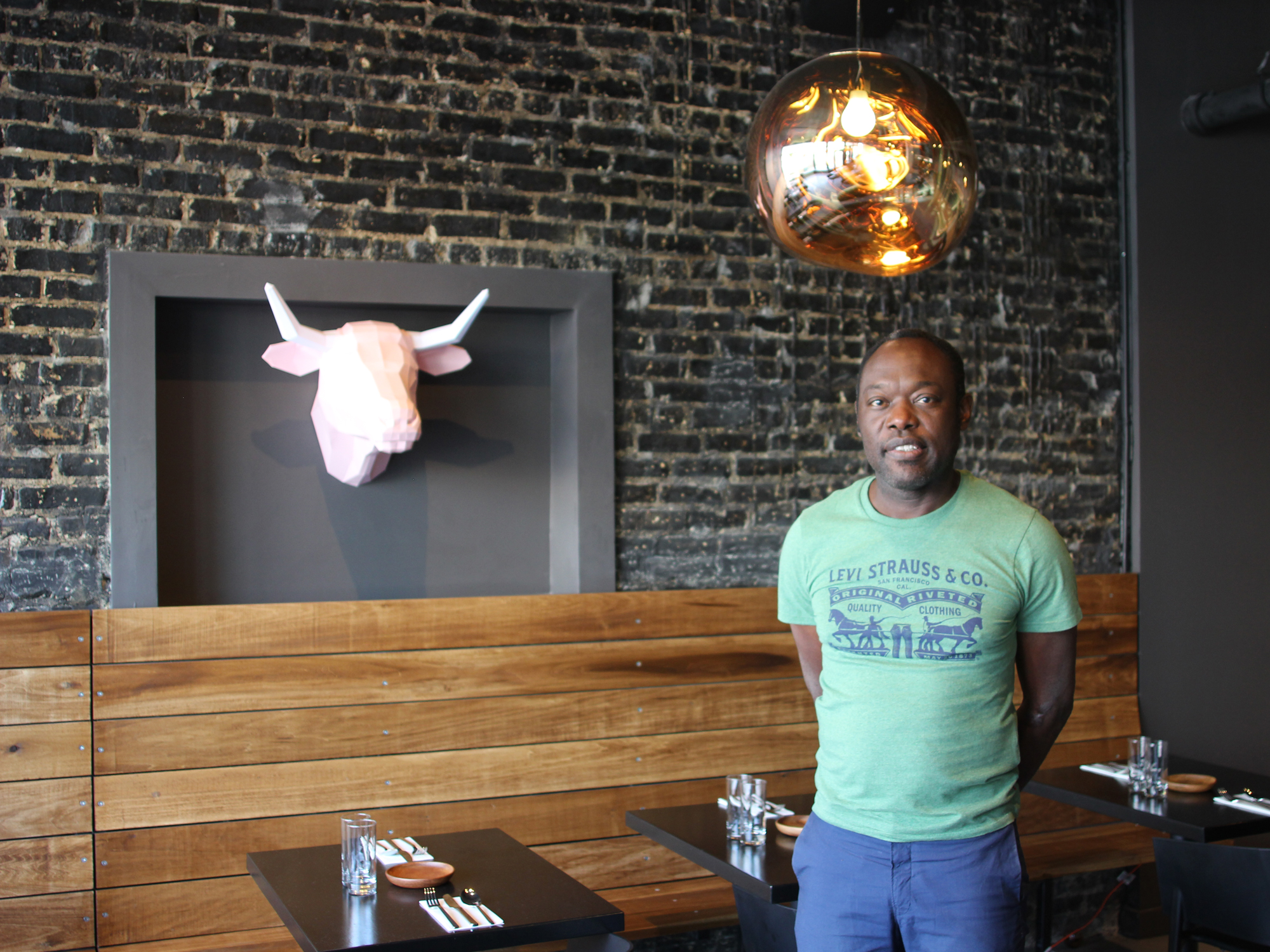
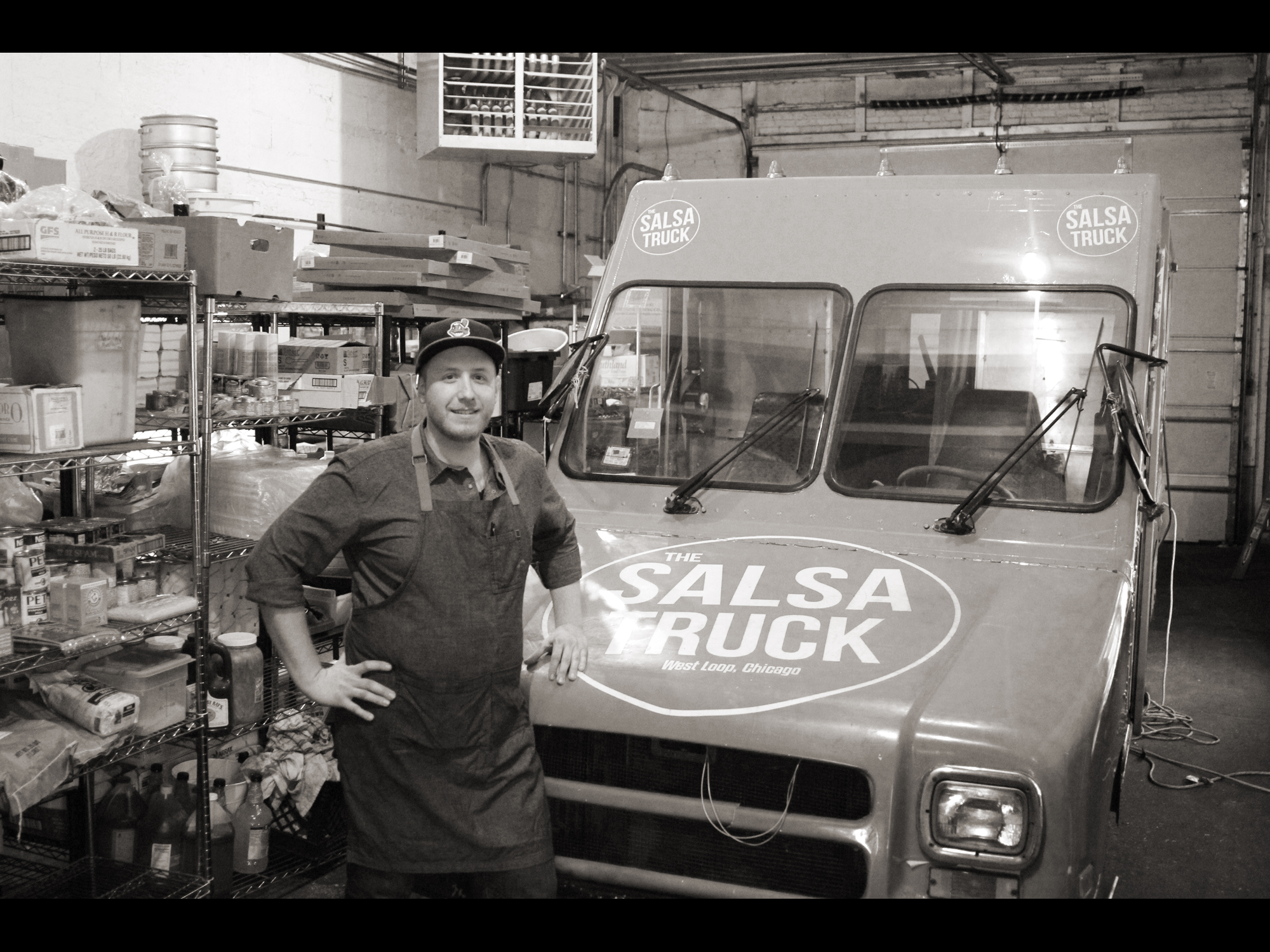
Fascinating story Mike.